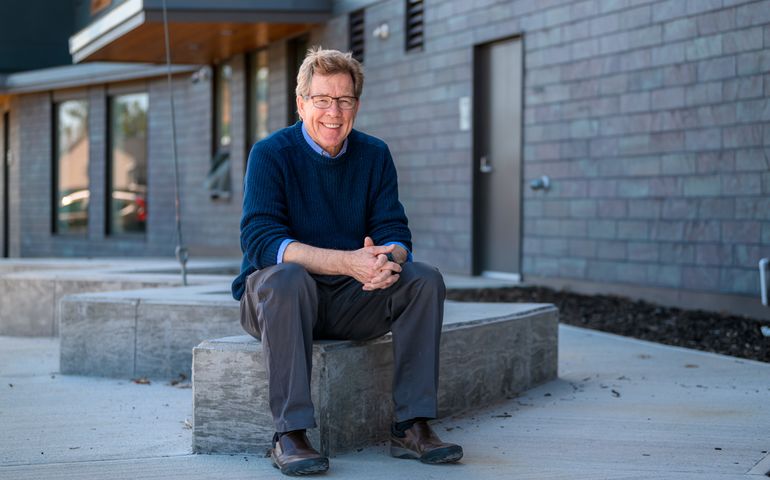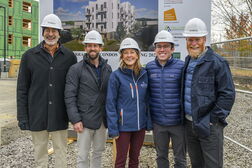On the Record: Before retiring, Avesta Housing CEO Dana Totman has a lot on his to-do list
 Photo / Jim Neuger
Dana Totman will retire in September as president and CEO of Avesta Housing, which develops much-needed affordable housing in Maine. He is shown here outside an apartment block in South Portland recently built by Avesta.
Photo / Jim Neuger
Dana Totman will retire in September as president and CEO of Avesta Housing, which develops much-needed affordable housing in Maine. He is shown here outside an apartment block in South Portland recently built by Avesta.
In more than two decades at the helm of Avesta Housing, Dana Totman has turned the Portland-based nonprofit into the region’s largest provider of affordable housing. It’s not quite an exit interview, but Mainebiz got his thoughts in advance of his retirement in September.
Mainebiz: How does Maine stack up to the rest of the country in terms of affordable housing?
Dana Totman: In short, not great. We generally define affordable housing as paying 30% or less of income on housing costs. Maine homeowners rank in the top 20% of states for paying more than 30% of their income on housing costs. Maine renters rank in the top 25%. In fact, 45% of Maine renters are spending more than 30% of their income on rent.
MB: What impact has the pandemic had on the need for affordable housing in Maine?
DT: Home prices and rental prices have shot up, making housing less affordable. Out-of-state buyers and renters have increased demand without a corresponding increase in supply. We’ve also seen significantly increased material costs and labor rates and supply chain problems, which have all driven up the cost of housing.
MB: What’s the right mix of nonprofit and affordable housing developers, and what value do private developers bring to the mix?
DT: I think 95% of market-rate housing should be developed by private developers. For affordable housing, nonprofits should produce 50% to 75% because of their long-term commitment, tax advantages and their fundamental public-purpose missions. Private developers are helpful in the affordable space because there are not enough nonprofits with capacity to meet the state’s needs.
MB: To what extent are Airbnb rentals affecting affordable housing supply?
DT: Airbnb and other short-term vacation rental companies like it are hurting our affordable housing supply by taking year-round homes out of the buying and rental markets.
MB: Where are Avesta’s developments?
DT: When I arrived here 22 years ago, Avesta didn’t have any developments in Portland. Today, 1,100 of our 3,200 units are in Portland, and most are on the peninsula. We have also steadily added development in other Maine and New Hampshire communities. With affordable housing needed everywhere, we will continue to develop in many communities, including Portland, on and off the peninsula.
MB: How has Avesta changed or grown during your time there?
DT: Avesta (then York Cumberland Housing) was a small, struggling organization when I started back in 2000. In hindsight, I didn’t fully know what I was getting into when I took the role — and it’s probably a good thing. During my time, Avesta has increased assets from $60 million to $350 million, grown our staff from 60 to 300, and expanded the number of homes in our portfolio from 700 to more than 3,200. Avesta is now the largest nonprofit affordable housing provider in northern New England.
MB: What’s still on your to-do list before you leave Avesta in September?
DT: I have a lot I want to do before I leave in September, including help new immigrants; watch for federal funds; provide some tiny level of encouragement to the people submitting 6,000-plus applications to us annually knowing 92% will not be able to secure homes; start providing mortgage relief assistance to struggling homeowners; secure more land for affordable housing; and express thanks to the many great people I have enjoyed working with over the years.
MB: And your retirement plans?
DT: My retirement plans are some combination of hiking, learning how to hit a golf ball, mowing lawns, doing some consulting, traveling with my wife, exercising, getting a new knee and painting my house. Growing up on a dairy farm, I had a steady increase of chores and work starting at age five, so concluding work is an unfamiliar concept.














0 Comments